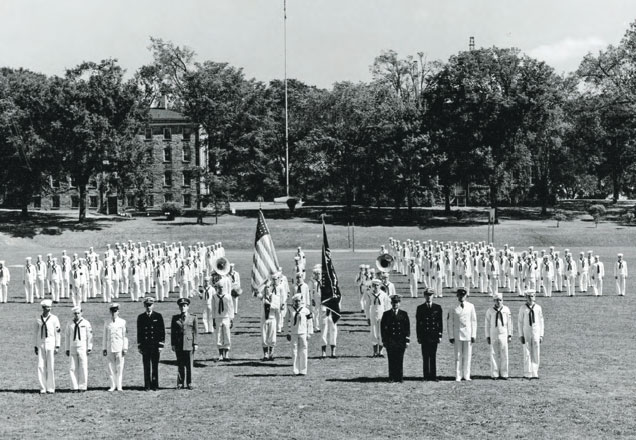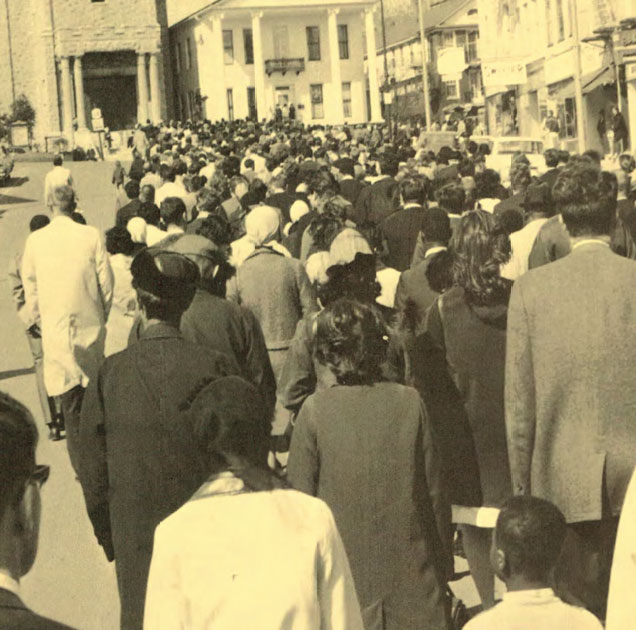
In Service
TRAINING GROUNDS.
From World War I through Vietnam, military training was a typical Hobart experience. In the spring of 1917, with students and faculty joining the war effort, the Student Army Training Corps was instituted, attracting nearly 200 enlistees who performed military drills two hours a day, five days a week. During World War II, to offset dropping enrollment and produce officers, the first group of Navy V-12 trainees arrived on campus July 1, 1943. From 1951 to 1964, the Air Force ROTC program was mandatory for all incoming students; amid growing faculty and student discontent, the program was shuttered in September of 1970, but as former director of alumni relations Ret. Lt. Col. John Norvell ’66, P’99, P’02 notes on his blog, Tales from Hobart and William Smith, the ROTC, like the V-12 program, “provided a valuable source of revenue to the cash-strapped Colleges.”
Photo: Navy V-12 trainees in formation on the Quad, ca. 1944–45.
 A LETTER HOME.
A LETTER HOME.
At least 75 Hobart alums, students and non-graduates served in the Union Army during the Civil War, including the accomplished Army officer, congressman and diplomat Union Brig. General Edward Stuyvesant Bragg, 1848.* (At least five students and/or alums fought for the Confederacy.) Another Civil War veteran, Sgt. Major Edward H.C. Taylor, 1861, who served with the Union Army’s 4th Regiment Michigan Infantry, documented his wartime experience in a collection of correspondence held by the HWS Archives. Taylor’s letter, dated Dec. 13, 1862, reads: “My dear Mother: I have but a word to write. A battle is going on and our Div. is just going in. Our troops are in Fredericksburg [Va.] and are fighting in the streets. This is the third day of the battle. How the scales will turn can hardly be told as yet. We have lost heavily and have a horrid position to gain. We hope for the best. I never felt less like a fight than now. I expect the Div. will take it tomorrow. Love to all. Edward.”
*The editors regret that on p. 40 of the print edition of this issue, Union Brig. Gen. Edward Stuyvesant Bragg, 1848,** was misidentified as the namesake of Fort Bragg. The North Carolina military base is in fact named for his relative, Confederate Gen. Braxton Bragg. Edward Bragg was born in Unadilla, N.Y. and educated at Geneva College, though he did not graduate. He later earned admission to the New York bar and settled in Wisconsin. After the attack on Fort Sumter in 1861, he raised a company of volunteers known as “Bragg’s Rifles,” who elected him their captain, and joined the Union Army’s 6th Wisconsin Volunteer Infantry Regiment. Just a few months later he was promoted to major and by 1863 had earned the rank of colonel. “The Little Colonel,” as he was nicknamed, fought in the Civil War battles at Fredericksburg and Chancellorsville, among others. He later commanded the famous Iron Brigade during momentous campaigns, including the Siege of Petersburg in 1864, when Bragg was promoted to brigadier general. After the war, he served in the U.S. House of Representatives from 1887-93 and later as a diplomat, representing the U.S. as minister to Mexico and as consul-general to both the Republic of Cuba and British Hong Kong. He died in 1912 at the age of 85.
**1848 is Bragg's correct class year, not 1844, as reported in the print edition.
CALL OF DUTY.

Approaching its Centennial, Hobart revised the curriculum to provide, as the 1920–21 catalog noted, a “thoroughly modern education in the arts and sciences, both as the needed introduction to professional or technical training and as an important preparation for civic life and duty.” Evident in the College’s earliest graduates, that dual sense of purpose extends through the Citizenship Course of the 1930s to today’s students and young alums, who carry forward the mantle of public duty — whether through elected office or military commissions, grassroots organizing or the annual Days of Service.
Above: As part of a 2019 Day of Service, students package meals in Bristol Field House in partnership with the international relief organization Rise Against Hunger.

Right: HWS and the Geneva community at the April 1968 march in memory of Dr. Martin Luther King Jr.

 A LETTER HOME.
A LETTER HOME.

